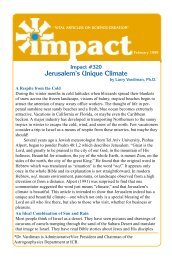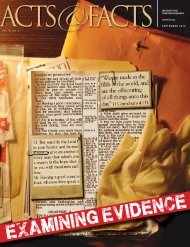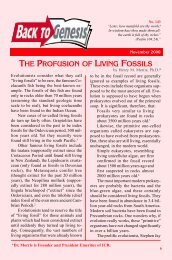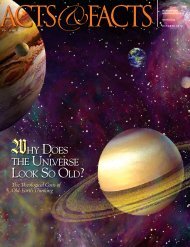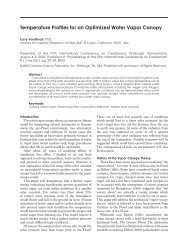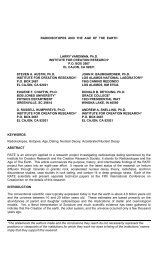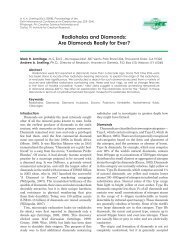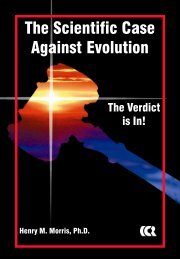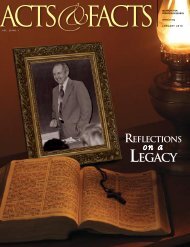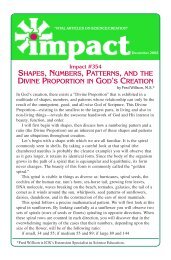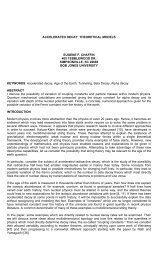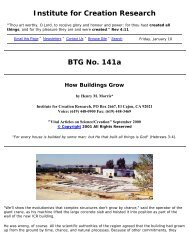Download September 2008 PDF - The Institute for Creation Research
Download September 2008 PDF - The Institute for Creation Research
Download September 2008 PDF - The Institute for Creation Research
You also want an ePaper? Increase the reach of your titles
YUMPU automatically turns print PDFs into web optimized ePapers that Google loves.
Man of Science, Man of God:James Clerk MaxwellC H R I S T I N E D A OFrom an early age, James Clerk Maxwellhad an astonishing memoryand an unquenchable curiosityabout how things worked. Hisfirst teacher, his mother, encouraged himto “look up through Nature to Nature’sGod”:His knowledge of Scripture, fromhis earliest boyhood, was extraordinarilyextensive and minute….<strong>The</strong>se things were not knownmerely by rote. <strong>The</strong>y occupied hisimagination, and sank deeper thananybody knew. 1After growing up mostly on anisolated country estate, young Maxwellentered the Edinburgh Academy in 1841.<strong>The</strong> other boys made fun of his mannerisms,accent, and wardrobe, but he soon befriendedLewis Campbell (his future biographer) andPeter Guthrie Tait. Both would become notablescholars, and remained his lifelong friends.While at Edinburgh, Maxwell won medals <strong>for</strong>mathematics and Scripture biography.At age 14, he wrote Oval Curves, a paperon the properties of ellipses and curves. It waspresented to the Royal Society of Edinburghby James Forbes, a University of Edinburghprofessor of natural philosophy, since Maxwellwas “too young” to present it himself. Maxwellentered the university at age 16 and producedRolling Curves. Once again he was consideredtoo young to present it to the Society, so thepaper was read by his mathematics professor,Philip Kelland.In October 1850, Maxwell left Scotland <strong>for</strong>Cambridge University, where he accomplisheda significant portion of his translation of electromagnetismequations, the work <strong>for</strong> which heis best known. He also laid out the principles ofcolor combination in Experiments on Colour—on which occasion he was finally allowed, in8 ACTS&FACTS • SEPTEMBER <strong>2008</strong>Who: James Clerk MaxwellWhat: Father of Electromagnetic <strong>The</strong>oryWhen: June 13, 1831 – November 5, 1879Where: Edinburgh, ScotlandMarch 1855, to present his own paper to theRoyal Society of Edinburgh. He became a fellowof Trinity College that October, and the followingyear applied <strong>for</strong> and eventually accepted theChair of Natural Philosophy at Marischal Collegein Aberdeen.When the college merged with the Universityof Aberdeen’s King’s College in 1860,there was no need <strong>for</strong> two chairs of natural philosophy,so Maxwell was laid off. He lost an Edinburghprofessorship to his childhood friendTait, but was granted the Chair of Natural Philosophyat King’s College in London.His color research garnered Maxwell electioninto the Royal Society of London in 1861.He often lectured at the Royal Institution, wherehe regularly conversed with Michael Faraday. AtKing’s College, he produced his most significantwork in electromagnetism, a multipartpaper called On Physical Lines ofForce. He also published papers on electrostaticsand displacement current, thelatter focusing on the phenomenonknown as the Faraday effect.He resigned from King’s Collegein 1865 and returned to hischildhood home at Glenlair, wherehe wrote the textbook <strong>The</strong>ory of Heatand an elementary treatise called Matterand Motion. In 1871, he became thefirst Cavendish Professor of Physics atCambridge. He died at 48 in Cambridgeof abdominal cancer on November 5, 1879.Darwin’s Origin of Species was publishedduring Maxwell’s lifetime. Maxwell was notconvinced evolution was a viable theory of origins,nor was he afraid to speak on the matter:No theory of evolution can be <strong>for</strong>med toaccount <strong>for</strong> the similarity of molecules, <strong>for</strong>evolution necessarily implies continuouschange, and the molecule is incapable ofgrowth or decay, or generation or destruction.…Scienceis incompetent to reasonupon the creation of matter itself out ofnothing. 2Maxwell is to this day held in high regardin the scientific community, but few know oracknowledge his strong Christian roots or hisfaith in the authority of God’s Word. Virtuallyevery part of his brief, but remarkable, life wasspent exploring the wonder of God’s creation.References1. Campbell, L. and W. Garnett. 1882. <strong>The</strong> Life of James ClerkMaxwell: With Selections from His Correspondence and OccasionalWritings. London: Macmillan and Co., 32.2. Ibid, 359.Ms. Dao is Assistant Editor.Maxwell photo: Sheila Terry / Photo <strong>Research</strong>ers, Inc.



